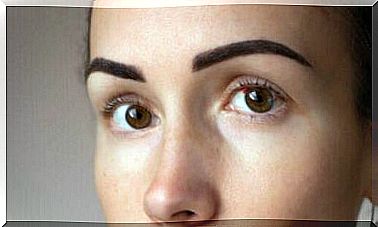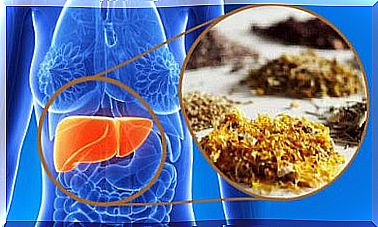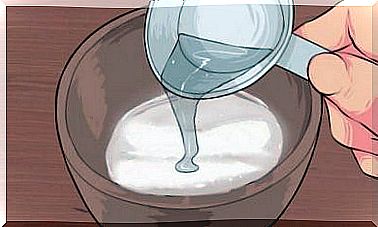Excessive Appetite: What Are The Causes?
Binge eating is not in itself a disease, but a symptom of an underlying disorder. The inexhaustible desire to eat may be due to an organic problem, drug use, or psychic reasons.

Binge eating or excessive appetite is an exaggerated increase in the feeling of hunger for no apparent reason. The word comes from the Greek roots “hiper”, which means “excess”, and “fagia”, which means “to eat”. This problem leads to disproportionate food intake.
The feeling of hunger is perfectly normal. It happens when the body needs nutrients to function properly. What is not normal is feeling hungry at all times, even shortly after a heavy meal. It is in these cases that we speak of binge eating.
The unbridled increase in appetite can be a sign of various diseases. Sometimes it is a symptom of endocrine disorders or mental disorders. Binge eating only occurs for a while, then goes away or persists for long periods of time.
What does it mean to have an excessive appetite?

An excessive increase in the sensation of appetite is known in medical terms as binge eating. In this condition, an overwhelming urge to eat occurs, even when there is no need for it. The affected person eats a large amount of food and does so all the time.
One of the hallmarks of binge eating is that the person swallows food and hardly chews it. It is an eating disorder, generally of psychological origin, which is very frequently accompanied by bulimia.
It is very common for people with binge eating to prolong meals beyond usual. Feeding does not end within a reasonable time, but continues to be ingested. In almost all cases, there is a predilection for certain types of food, especially sweet or fatty products.
Another distinguishing feature of this disorder is that the affected person shows signs of shame about their condition. If anyone is looking at her, she is nervous. However, she cannot stop the ravenous appetite she is having, nor stop eating, despite her shame.
The causes
Excessive appetite or binge eating is not a disease in itself, but a symptom of another disorder. Sometimes the cause of this problem is organic pathology. People with diabetes mellitus, hyperthyroidism or hypoglycemia may have episodes of binge eating, according to a publication in the journal Obesity.
There are also drugs that can lead to this problem. These are drugs that inhibit the production of leptin. This hormone is responsible for regulating the feeling of hunger.
If this barrier is not functioning properly, the feeling of fullness does not occur with food either. Research in mice, such as that published in the journal Proceedings of the National Academy of Sciences of the United States of America , has correlated problems with the production of this hormone with the process of binge eating.
Most often, this problem is related to a mental disorder. Stress, depression or anxiety can lead to eating disorders. It is very common for binge eating is accompanied by bulimia, according to a study published in 2008.
In bulimia, there is an excessive ingestion of food for a short time. These episodes are commonly referred to as “binge”. Later, the affected person experiences strong feelings of guilt and then seeks to eliminate the excess food through induced vomiting or laxatives.
Symptoms and diagnosis

As we have already pointed out, one of the typical symptoms of binge eating is the feeling of shame it produces in those who suffer from it. Therefore, it is not uncommon for the affected person to end up isolating themselves at mealtime, to prevent others from detecting their behavior.
These types of people are pecking anytime, even early in the morning. The feeling of hunger does not go away and, therefore, they are forced to do so. This behavior is often accompanied by feelings of depression and low self-esteem.
This excessive way of eating leads to digestive problems. It is not uncommon for there to be heartburn, diarrhea, vomiting, and stomach upset. This often leads to other illnesses such as overweight, diabetes, high cholesterol, and cardiovascular problems.
Excessive food intake also causes drowsiness and slows down a person’s normal activity. Diagnosis is usually based on observation of behavior. In general, it is the witnesses of the behavior that alert to a problem.
Treatment of excessive appetite
To perform the treatment, the cause of the binge must first be determined. If it is associated with a basic organic disease, it is indicated to treat it so that it does not generate episodes of excess appetite.
Likewise, if the problem is caused by a drug, if possible it should be replaced by one that does not generate this side effect. If the cause is psychic, the problem will be treated by a psychologist. It will focus on increasing self-esteem and decreasing anxiety.
Sometimes this disorder is completely harmless and temporary. This is the case for pregnant women, athletes and adolescents. In all three conditions, there are times when an additional supply of nutrients is needed and, as a result, the appetite tends to increase excessively.
Overeating, an eating disorder
Overeating produces excessive appetite which leads to the ingestion of food in larger amounts than necessary. It is important to identify the causes in order to remedy this situation. If you think you have this disorder, see your doctor to start appropriate treatment.









